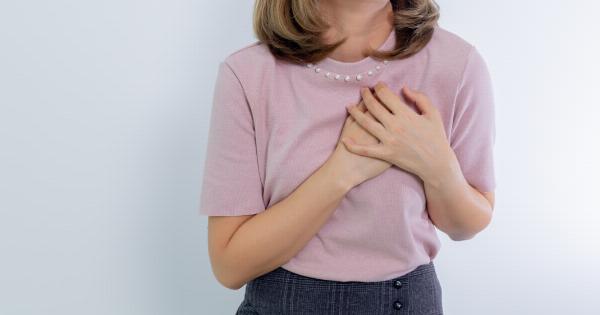Heart attack is a life-threatening condition that can happen to anyone, at any time. When most people think of a heart attack, they picture a sudden, intense pain in the chest.
However, heart attack symptoms are different for everyone, and women tend to experience symptoms that are less obvious than men. In fact, the symptoms of a heart attack in women can be so subtle that they are often missed or ignored. Here are ten common symptoms of a heart attack that women tend to miss.
1. Shortness of Breath
Shortness of breath is a common symptom of a heart attack in women. However, it can be easily overlooked or attributed to another condition, such as asthma or bronchitis.
If you find yourself feeling short of breath without explanation, especially if accompanied by any other symptoms, it’s important to seek medical attention right away.
2. Fatigue
Many women experience fatigue on a daily basis, but if you suddenly feel extremely tired or lethargic to the point where it interferes with your daily activities, it could be a sign of a heart attack.
This is often accompanied by other symptoms such as shortness of breath and chest discomfort.
3. Nausea or Vomiting
While nausea and vomiting are common symptoms of many illnesses, they are also a common symptom of a heart attack in women. This is often accompanied by other symptoms such as chest discomfort, shortness of breath, and fatigue.
If you experience these symptoms, it’s important to seek medical attention right away.
4. Jaw, Neck, Shoulder or Back Pain
Women are more likely to experience pain in areas other than the chest during a heart attack. Pain in the jaw, neck, shoulder, or back can all be signs of an impending heart attack.
This type of pain can come on suddenly or gradually and may be accompanied by other symptoms such as shortness of breath and fatigue.
5. Dizziness or Lightheadedness
Feeling dizzy or lightheaded is another symptom of a heart attack in women. This can be caused by a drop in blood pressure or a constriction of blood vessels.
It’s important to seek medical attention if you experience these symptoms, especially if accompanied by other symptoms.
6. Sweating
Sweating is a common symptom of a heart attack in women. This can occur at any time, even if you are not exerting yourself.
If you experience unexplained sweating, especially if accompanied by other symptoms, it’s important to seek medical attention right away.
7. Indigestion or Heartburn
Many women experience indigestion or heartburn on a regular basis. However, if you suddenly experience severe or persistent indigestion or heartburn, especially if accompanied by other symptoms, it could be a sign of a heart attack.
8. Unexplained Anxiety or Panic
If you suddenly feel a sense of unexplained anxiety or panic, it could be a sign of a heart attack. This can be accompanied by other symptoms such as shortness of breath and sweating.
9. Weakness or Numbness in Arms
Weakness or numbness in the arms can be a sign of a heart attack in women. This is often accompanied by other symptoms such as chest discomfort, shortness of breath, and fatigue.
10. Chest Discomfort
While women are less likely to experience chest discomfort during a heart attack than men, it is still a common symptom. The discomfort can be a feeling of pressure, fullness, or squeezing, and can last for several minutes or come and go.
If you experience any type of chest discomfort, it’s important to seek medical attention right away.
Conclusion
Heart attack symptoms can vary from person to person, and women tend to experience symptoms that are less obvious than men.
It’s important to pay attention to your body and seek medical attention if you experience any of the symptoms listed above, especially if they occur suddenly or are accompanied by other symptoms. Remember, time is of the essence when it comes to a heart attack, so don’t hesitate to call for emergency medical help if you suspect you may be having one.
























